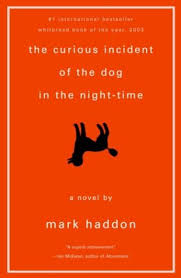 I just finished reading 'The Curious Incident of the Dog in the Night-Time.' This book, besides being a fabulous vacation book (defined as interesting, small, and not a page turner that has you reading all of vacation when you are supposed to be out and doing things), was a really interesting book that had a lot of new perspectives on many different things. I realize that is vague, so I'll go into a little more detail. Essentially, this is the story of a teenage boy who sets out to figure out who has stabbed his neighbors dog. In the process, his story becomes one of family and truth and independence. I'm sure there are a lot of stories like this. However, this book is told in the first person by a teenage male speaker with autism. I think the fact that I am a special ed teacher drew me into the book, but you do not have to have any background in autism to appreciate the book. The speaker, Christopher, tells his story of his investigation into who killed his neighbor's dog. However, about half the chapters have nothing to do with his story. Instead, they are about math problems, his beliefs about various subjects like science and math, and his past. Christopher is an extremely logical person who does not dwell on sadness and has very unique and not always acceptable ways of dealing with his problems. Here are three quotes I especially liked:
I just finished reading 'The Curious Incident of the Dog in the Night-Time.' This book, besides being a fabulous vacation book (defined as interesting, small, and not a page turner that has you reading all of vacation when you are supposed to be out and doing things), was a really interesting book that had a lot of new perspectives on many different things. I realize that is vague, so I'll go into a little more detail. Essentially, this is the story of a teenage boy who sets out to figure out who has stabbed his neighbors dog. In the process, his story becomes one of family and truth and independence. I'm sure there are a lot of stories like this. However, this book is told in the first person by a teenage male speaker with autism. I think the fact that I am a special ed teacher drew me into the book, but you do not have to have any background in autism to appreciate the book. The speaker, Christopher, tells his story of his investigation into who killed his neighbor's dog. However, about half the chapters have nothing to do with his story. Instead, they are about math problems, his beliefs about various subjects like science and math, and his past. Christopher is an extremely logical person who does not dwell on sadness and has very unique and not always acceptable ways of dealing with his problems. Here are three quotes I especially liked:"All the other children at my school are stupid. Except I'm not meant to call them stupid, even though that is what they are. I'm meant to say that they have learning difficulties or that they have special needs. But this is stupid because everyone has learning difficulties because learning to speak French or understanding relativity is difficult and also everyone has special needs, like Father, who has to carry a little packet of artificial sweetening tablets around with him to put in his coffee to stop him from getting fat, or Mrs. Peters, who wears a beige-colored hearing aid, or Siobhan, who has glasses so thick they give you a headache if you borrow them, and none of these people are Special Needs, even if they have special needs" p. 42=43
"Mr. Jeavons said that I liked maths because it was safe. He said I liked maths because it meant solving problems, and these problems were difficult and interesting but there was always a straightforward answer in the end. And what he meant was that maths was not like life because in life there are no straightforward answers in the end." p. 61-62
"And whenever I thought about the future I couldn't see anything clearly in my head and that made a panic start. So Siobhan said I shouldn't think about the future. She said 'Just think about today. Think about all the things that have happened. Especially about the good things that have happened.'"
Those excerpts give an accurate look at the writing style of the book. It is easy to follow along but sometimes when Christopher starts to explain math problems it gets a little tough, although I understood most of those parts. Additionally, they were not vital to the story so if it was problematic those parts could be skimmed or skipped.
So, interesting perspectives, unique protagonist, chapters labeled by prime numbers, etc. Pretty cool stuff in this book. I highly recommend. And I'm ranking it between Anne of Green Gables and Alice's Adventures in Wonderland.
Next up: ? Before vacation, I was thinking about resuming Lord of the Rings with The Two Towers, but I think I'm still in the mood for something lighter. And after reading Haddon, I think I'm in the mood for another coming of age type story. So, I may start instead with Life of Pi. Although there are still a great many books that are on my shelf that have yet to be read so you never know...
No comments:
Post a Comment